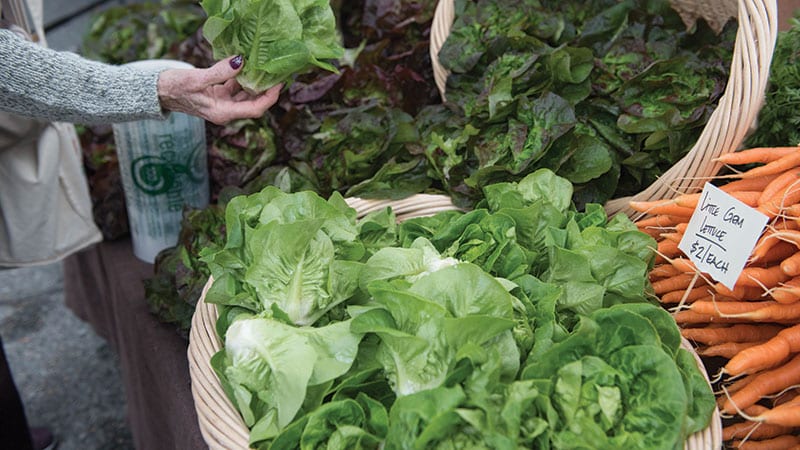New challenges and new ways to connect
This article was originally published in May 2020

For more than 25 years, PCC volunteers have gathered at our partner food banks each month to package donated bulk foods and support hungry people in our communities. For about the same length of time, the region’s farmers and producers have gathered at Seattle’s beloved farmers markets to sell their harvests.
This spring, everything changed.
As the novel coronavirus (COVID-19) outbreak began spreading through the U.S., both our community’s needs and the supply chain shifted fast. Our partner food banks faced a shortage of fresh produce, while local farmers were losing sales from the closure of Seattle farmers markets. At the same time, volunteer gatherings like our bulk food packaging parties at local food banks were suspended due to social distancing requirements. We knew we had to think creatively about our food bank program, and fast.
Working with Seattle’s Neighborhood Farmers Market Alliance, we found a way to create a partnership that would grow our food bank program’s impact. Together, we created a new model of Community Supported Agriculture (CSA) that connected local farms impacted by farmers market closures with our local food bank partners. We kickstarted the project with $80,000 from our shopper-funded food bank fund, with 100% of the donation used to purchase local produce from affected farms for food banks.
This partnership was just one small example of the co-op’s response to the unprecedented challenges our community and nation have faced this spring. Our immediate response also included donations to Northwest Harvest, Food Lifeline and the Seattle Food Committee, as well as donations of hand washing facilities to community partners. Rather than sending our members a free offer, we donated that product, shelf-stable Salumi salami, to neighborhood partner food banks. Throughout the emergence of the crisis, our stores continued our daily grocery rescue program, working with our partners as their needs and staffing constantly shifted.
For example, when one food bank was hit hard by the coronavirus and associated quarantine, it could no longer staff food pickups from our store. Our team jumped in to help, making deliveries from the store to the food bank three times a week.
It wasn’t just PCC and food banks affected. PCC suppliers found that a disrupted supply chain left them with excess stock. Multiple vendors reached out with innovative ideas for connecting them with community members who had needs, such as donating soaps from Moon Valley Organics to the Chicken Soup Brigade, which works with chronically ill members of the community.
Of all the actions we took in our immediate response, the collaboration with our friends at Neighborhood Farmers Markets amplified our local impact the most. The project started when they reached out to us because their produce vendors were facing the largest losses due to farmers market closures and asked if PCC could help. It seemed there had to be a way to connect food banks needing produce with local farmers who had a surplus of the freshest produce you could find and no way to distribute it. Knowing the urgency of the situation, PCC Community Markets and our partners worked together to form a plan in less than a week.
Samantha Kielty, program manager for the Neighborhood Farmers Markets, noted that the farmers market closures ordered in Seattle in March had a wide impact—affecting farmers, the public at large, and also customers depending on food access programs such as SNAP Market Match and Fresh Bucks, who lost access to much needed basic food programs overnight.
“Farmers market closures have forced us to be creative in our efforts to stabilize an already fragile local food system, which is why partnerships between PCC and the Neighborhood Farmers Markets have become more important than ever,” she said. The new partnership “supplied food banks with access to high quality, nutrient rich produce while providing dependable sales outlets for Washington’s family farms and helping to create a more stable and just food system.”
When it comes to the region’s emergency food system, the complexities facing our partners have compounded daily, but the work toward solutions has grown right along with the need.
The COVID-19 outbreak has caused immeasurable tragedies and upheaval. It has separated many of us physically.
Still, as colleagues from various sectors have emailed, Skyped, and Zoomed about new challenges, they’ve found creative solutions for supporting our friends, families and neighbors. The dedication and commitment we have witnessed from leaders in the emergency food system has been deeply humbling and inspiring.
While the precautionary measures we must take to protect one another are causing us to slow down, ask for support and accept help, the end result is that we are forging a new way forward together. Thank you for your participation in this community work.
We welcome donations to PCC’s food bank program at pccmarkets.com/sustainability/food-bank-program.
More information on supporting the Neighborhood Farmers Market Alliance is online here.
